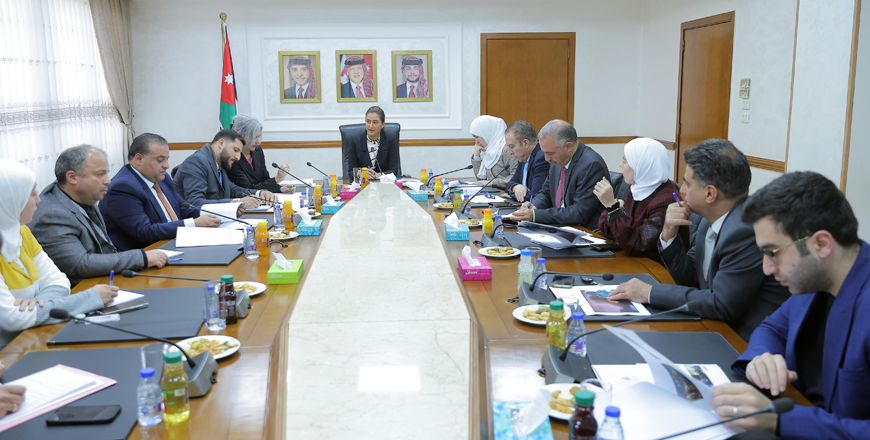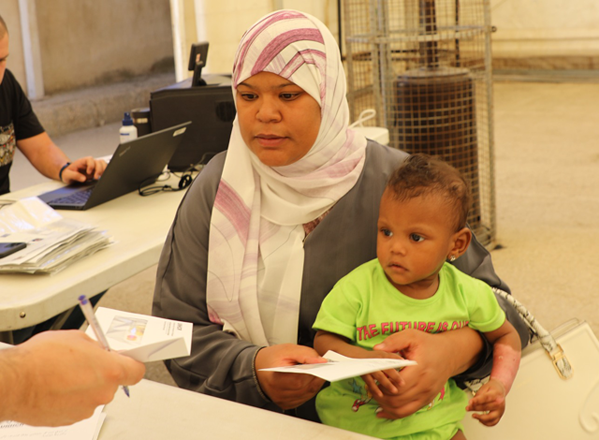You are here
UNHCR representative to Jordan says 'too early' to determine political implications of developments in Syria
By Heba Elayyan - Dec 14,2024 - Last updated at Dec 14,2024

Maria Stavropoulou
-'Stabilisation in Syria might encourage some refugees to consider returning'
-Refugees need time, space to absorb new reality, make decisions for themselves, their families
-'If a refugee decides to go back voluntarily, there is nothing stopping them'
-'Around 500 Syrians have been returning monthly to Syria, prior to latest political developments'
-'We do not want refugees to return to a situation of displacement. They must return in safety, dignity, not to camps'
AMMAN — The UNHCR has expressed cautious optimism about recent political developments in Syria and their potential impact on the voluntary return of refugees displaced since the civil erupted in 2011. With millions of Syrians uprooted, the crisis remains one of the largest displacement crises in modern history.
Maria Stavropoulou, the newly appointed UNHCR Representative to Jordan, said during a recent interview with The Jordan Times that it is "too early to determine the long-term implications of this political shift. “It is very soon to know how the situation will develop there [in Syria].”
With 620,000 Syrian refugees registered with the UNHCR in Jordan, the world’s second-highest number of refugees per capita, Stavropoulou acknowledged that stabilization in Syria might encourage some refugees to consider returning. However, she stressed. “It is important to give them the time and space to absorb a new reality and to make decisions for themselves and their families,” she explained.
Stavropoulou reaffirmed the UNHCR’s respect for refugees’ right to voluntarily return to their home country. “If a refugee decides to go back voluntarily, there is nothing stopping them,” she said.
She added that refugees have expressed mixed emotions, joy and excitement about the changes in Syria, alongside anxiety and uncertainty about how the situation will unfold. “Generally speaking, refugees aspire to go back to their home country one day. Depending on developments, they might decide to return sooner or wait to see what happens,” she said.
Despite ongoing challenges, Stavropoulou revealed that approximately 500 Syrians have been returning monthly to Syria, even prior to the latest political developments. She highlighted UNHCR’s close coordination with Jordan’s Ministry of Interior to monitor these movements.
Reports of European countries reconsidering Syrian asylum applications were also addressed. Stavropoulou clarified that some governments have paused decision-making, awaiting further clarity on the ground situation in Syria. “This is not the same as stopping new applications altogether,” she explained.
Stavropoulou reiterated the international legal protections afforded to Syrian refugees. “They retain their rights, including the right not to be sent to a country where they might face risks. This could change eventually, but not yet,” she said.
She firmly opposed the establishment of refugee camps inside Syria, despite increasing pressure on Jordan’s resources. “We do not want refugees to return to a situation of displacement. They must return in safety and dignity, not to camps,” she stressed.
Jordan’s population is estimated at 11.5 million by the end of 2023, with at least one-third being non-Jordanians, according to the Higher Population Council (HPC). “Over the past 19 years, the population has increased by 6 million, with official data showing that the percentage of non-Jordanians living in the Kingdom has grown from 4.2 per cent in 1979 to 30.6 per cent in 2015.”
On the Syrian Refugee Response Plan, Stavropoulou noted it is being updated in preparation for 2025. However, she highlighted the declining financial support for refugee programs as a critical issue. “Funding for UNHCR and other operations has been decreasing. This affects refugees’ welfare, increasing poverty rates and limiting their access to proper housing,” she said.
According to UNHCR’s 2024 socioeconomic survey, poverty among Syrian refugees in Jordan has spiked from 57 per cent to 67 per cent over the past two years, coinciding with broader economic difficulties affecting vulnerable Jordanians.
Two-thirds of refugee families now live in poverty, with a significant drop in average monthly incomes.
Stavropoulou called on the global community to renew its commitment to Jordan’s efforts. “The international community has an obligation to stand by Jordan and sustain the refugee response, especially in light of recent developments,” she concluded.
Related Articles
AMMAN — The Lower House Foreign Affairs Committee on Wednesday said that Jordan's public sentiment is in harmony with His Majesty King Abdul
AMMAN — A Syrian family is facing an eviction threat for not being able to pay their rent in Zarqa.
AMMAN — The UNHCR on Monday said that a manual validation of the number of Syrian refugees who returned home from Jordan after the reopening
















